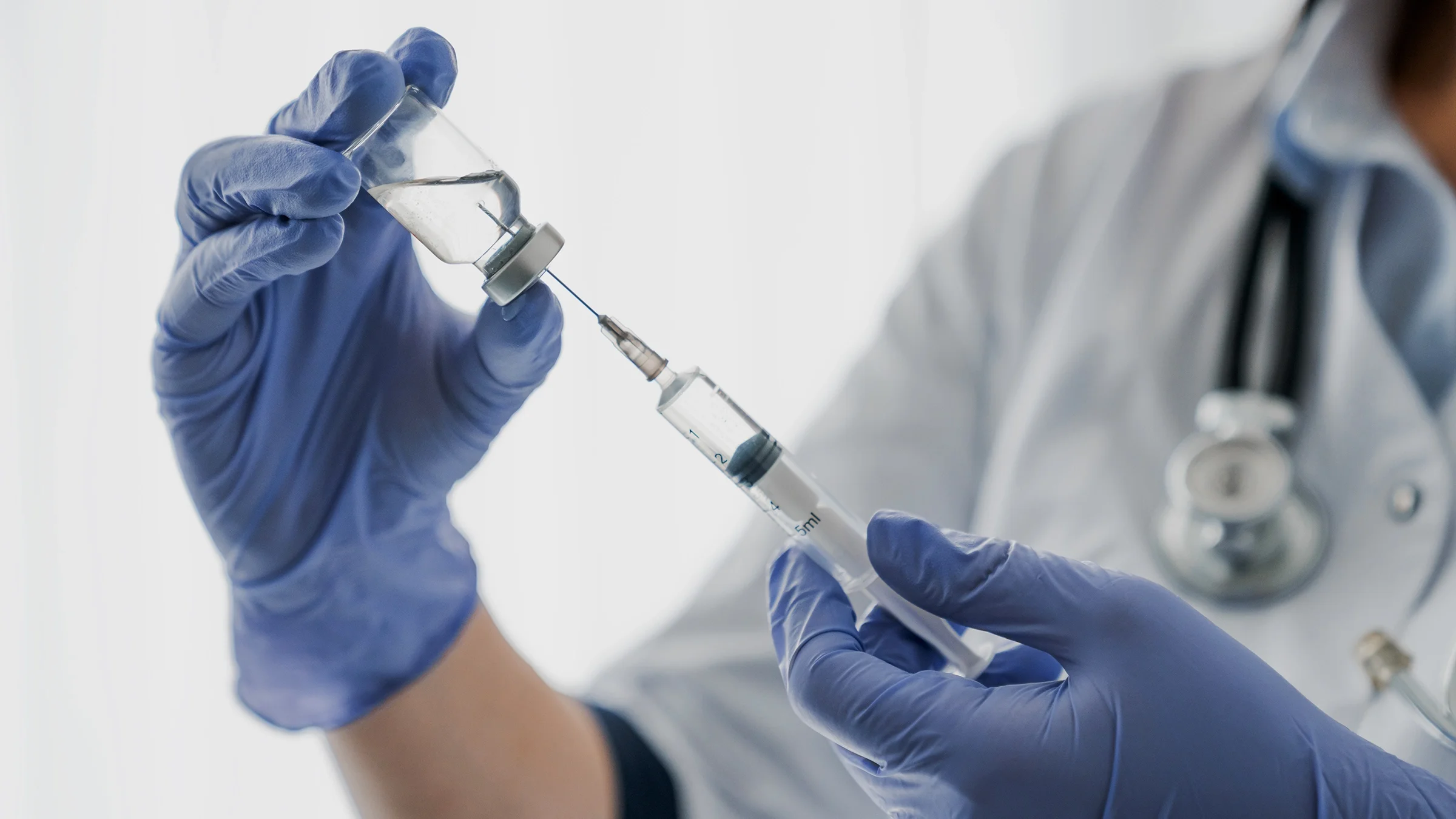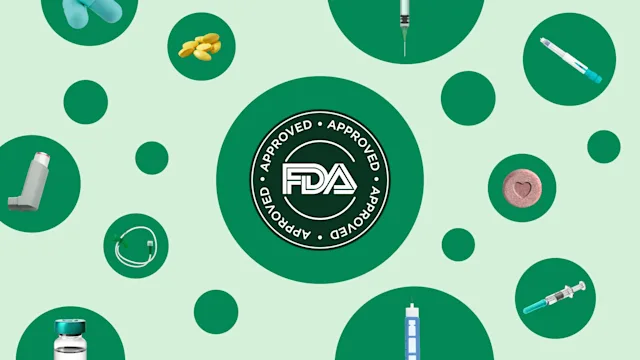Key takeaways:
Biologics are complex medications that come from living sources. Like generic medications, biosimilars are a subset of biologics that can be more affordable versions of other biologic products.
Many biosimilars are available in the U.S., including Inflectra (infliximab-dyyb), Mvasi (bevacizumab-awwb), and Zarxio (filgrastim-sndz). Compared to their reference (original) biologics, they’re highly similar in safety and effectiveness. But they come at a lower cost.
Some biosimilars are interchangeable with their reference biologic. For instance, if you’re prescribed Lantus (insulin glargine) for diabetes, your pharmacist may be able to switch you to Semglee (insulin glargine-yfgn) or Rezvoglar (insulin glargine-aglr).
Save on related medications
Biologics and biosimilars. They’re a complex group of medications made from living sources. Yet, they aim to simplify your life by helping enhance your treatment plan. They can also treat various health conditions — ranging from diabetes and cancer to autoimmune disorders.
But, accessing some biologics can be tough. You may need to go to a hospital or clinic to receive them, and their out-of-pocket costs may be higher than you’d like. Biosimilar drugs are a growing subset of biologics being developed as a way to access the medications you need at a lower cost. Biosimilar medications are highly similar in structure, safety, and effectiveness to an original (reference) biologic medication.
About biosimilar drugs
Generic medications are usually more affordable versions of brand-name drugs. And in most cases, you can expect them to be just as safe and effective as their brand-name equivalents. This is similar to the relationship between biosimilar medications and their original (reference) biologic. Biosimilars are like “generic” versions of biologics.
Just like how some brand medications don’t have generics, not all biologics have biosimilars. But if you’re prescribed one that does, your healthcare provider or health insurance plan may recommend the biosimilar instead.
Between 2015 and 2022, the FDA approved 40 biosimilar medications. Twenty of them — including four interchangeable biosimilars that your pharmacist can swap for depending on your state’s laws — are summarized below.
1. Semglee
If you use a long-acting insulin to treat diabetes, you’re probably familiar with Lantus. It’s a popular version of insulin glargine that has been available for two decades. But now, Semglee (insulin glargine-yfgn) is a biosimilar option to consider. It comes in multi-dose vials and injection pens.
What’s more, Semglee is an interchangeable biosimilar to Lantus. If your pharmacist receives a prescription for Lantus, they may be able to give you Semglee without the extra hurdle of contacting your prescriber. The two medications offer similar benefits. Also, you can switch back and forth between products without facing issues.
Semglee versus Lantus is detailed in another GoodRx article.
2. Rezvoglar
Rezvoglar (insulin glargine-aglr) is also biosimilar to Lantus. Available as an injection pen, you can expect Rezvoglar to offer comparable benefits.
What’s more, as of November 2022, Rezvoglar is also an interchangeable biosimilar for Lantus.
3. Humira biosimilars like Cyltezo
Humira (adalimumab) is a popular biologic that treats autoimmune conditions like rheumatoid arthritis (RA), inflammatory bowel disease (IBD), and more. Several Humira biosimilars have been approved, but patent restrictions have prevented them from being released right away.
But, at least eight Humira biosimilars are expected to launch over the course of 2023. They include:
Amjevita (adalimumab-atto)
Cyltezo (adalimumab-adbm; interchangeable with Humira)
Hyrimoz (adalimumab-adaz)
Hadlima (adalimumab-bwwd)
Abrilada (adalimumab-afzb)
Hulio (adalimumab-fkjp)
Yusimry (adalimumab-aqvh)
Idacio (adalimumab-aacf)
Humira biosimilars are discussed in a previous GoodRx Health article.
4. Inflectra
Remicade (infliximab) is a widely-used biologic that treats many autoimmune disorders. But since 2016, Inflectra (infliximab-dyyb) has given people taking it another option. Inflectra was the first FDA-approved Remicade biosimilar.
If you have a condition like RA or IBD, your healthcare provider may give you Remicade or Inflectra. Both medications are infused into your vein every 6 to 8 weeks at a clinic, and they’re expected to provide similar benefits as each other.
Inflectra and Remicade are highlighted in another GoodRx article.
5. Renflexis
Renflexis (infliximab-abda) is another Remicade biosimilar. It shares the same benefits and uses as Inflectra and Remicade. Depending on your infusion center and insurance coverage status, you may receive Renflexis over another infliximab product.
6. Avsola
Avsola (infliximab-axxq) is also biosimilar to Remicade. Approved in 2019, it’s the fourth and most recent one. There aren’t clinically meaningful differences between Avsola, Remicade, and other Remicade biosimilars.
7. Erelzi
Erelzi (etanercept-szzs) is one of two biosimilars to Enbrel (etanercept). These are once-weekly medications that you can inject under your skin for several autoimmune disorders.
However, due to patent restrictions, Enbrel biosimilars won’t be available in the U.S. until at least 2029.
8. Truxima
Truxima (rituximab-abbs) is biosimilar to Rituxan (rituximab), a biologic medication that treats blood cancers and autoimmune disorders like RA. It’s given as an infusion into your vein every few weeks or months.
In general, both medications offer the same benefits and risks. But unlike Rituxan, Truxima isn’t approved to treat a blistering skin condition called pemphigus vulgaris. It also isn’t approved for kids.
9. Riabni
Riabni (rituximab-arrx) is another biosimilar to Rituxan. Its uses and benefits follow in Truxima’s footsteps. Depending on where you get your treatments, your healthcare team may opt to give you Riabni — or another Rituxan biosimilar — instead of Rituxan.
10. Ogivri
Ogivri (trastuzumab-dkst) was the first of several Herceptin (trastuzumab) biosimilars. If you or a loved one have HER2+ breast or stomach cancer, both medications are options for you to use. They’re given as intravenous infusions every 1 to 3 weeks.
They have similar benefits and uses. So, your healthcare provider and insurance will help you figure out if you should get one over another.
11. Kanjinti
Kanjinti (trastuzumab-anns) is also biosimilar to Herceptin. Approved in 2019, it’s the fifth and most recent Herceptin biosimilar to obtain approval. There aren’t any clinically meaningful differences between Kanjinti and Herceptin.
12. Mvasi
Avastin (bevacizumab) is a biologic medication that treats many types of cancer. It’s infused into your vein every 2 to 3 weeks. It’s also often used along with chemotherapy as an added treatment. It also has many biosimilars, such as Mvasi (bevacizumab-awwb). Mvasi and Avastin offer similar benefits for the same uses.
However, liver cancer is an exception. Because of how it was studied, only Avastin is approved to treat liver cancer.
13. Zirabev
Zirabev (bevacizumab-bvzr) is another Avastin biosimilar. Aside from being approved for liver cancer, there aren’t any notable differences between Zirabev and Avastin. You may receive one or the other depending on your healthcare provider or insurance plan’s preferences.
14. Byooviz
Byooviz (ranibizumab-nuna) was the first Lucentis (ranibizumab) biosimilar — and the first ever biosimilar eye medication. This vision-saving medication is used to treat eye conditions that can lead to blindness or vision impairment. You receive it as an injection into your eye every 1 to 3 months.
Lucentis is approved to treat five different eye conditions. But, Byooviz is only approved to treat three. Byooviz and Lucentis are compared in another GoodRx Health article.
15. Cimerli
Cimerli (ranibizumab-eqrn) is also biosimilar to Lucentis. But a few factors distinguish it from Byooviz.
Cimeli is interchangeable with Lucentis. As with other interchangeable biosimilars, Cimerli has gone through further studies showing that you and your ophthalmologist can switch between products without issues. Cimerli and Lucentis can also fight vision loss caused by the same five eye conditions.
16. Zarxio
Zarxio (filgrastim-sndz) was the first ever biosimilar medication. It was approved in early 2015 as a biosimilar to Neupogen (filgrastim). When needed, your healthcare provider may inject these medications under your skin or into a vein.
Neupogen and Zarxio trigger your bone marrow to make white blood cells. If you’ve received chemotherapy or a bone marrow transplant and your white blood cell counts drop too low, these medications can help bring them back to normal. They help prevent severe infection, and there aren’t any clinically meaningful differences between them.
Exception: Only Neupogen is approved to treat low white blood cell counts caused by high amounts of radiation. Neupogen’s biosimilars aren’t used for this.
17. Releuko
Releuko (filgrastim-ayow) is another Neupogen biosimilar. It’s another option your healthcare provider or health insurance may prefer if you need to boost your white blood cell counts.
Unlike other filgrastim products, Releuko isn’t able to help you prepare for a bone marrow transplant in advance. Otherwise, there aren’t any meaningful differences between Releuko and other Neupogen biosimilars.
18. Fulphila
Fulphila (pegfilgrastim-jmdb) was the first of six Neulasta biosimilars. Neulasta (pegfilgrastim) is a biologic that’s similar to Neupogen, mentioned above. But it lasts longer in your body, so you don’t need to get it quite as often. Neupogen may be used daily, while Neulasta may be given once per chemotherapy cycle.
Neulasta and its biosimilars are available as under the skin injections. But Neulasta also comes as an on-body injector (Neulasta Onpro). This is a medical device that your healthcare provider can apply to your skin if you’d rather receive your Neulasta dose at home.
19. Udenyca
Udenyca (pegfilgrastim-cbqv) is another example of a Neulasta biosimilar. It’s available as an under-the-skin injection; it has similar benefits and uses as Neulasta and other Neulasta biosimilars.
20. Retacrit
Retacrit (epoetin alfa-epbx) is biosimilar to two medications: Epogen (epoetin alfa) and Procrit (epoetin alfa). Your healthcare provider may inject one of these medications under your skin or into your vein as needed to increase your red blood cell counts. This can treat anemia from certain causes and lowers the need for blood transfusions.
You can expect similar benefits and risks from all three medications.
The bottom line
Many biosimilar drugs are available in the U.S. Between 2015 and 2022, 40 biosimilars were approved for use. Top examples include Inflectra, Mvasi, and Zarxio. A few interchangeable biosimilars, like Semglee and Cimerli, are also available.

Why trust our experts?


References
American Cancer Society. (n.d.). Stem cell or bone marrow transplant.
Amgen Inc. (2021). Mvasi [package insert].
Amgen Inc. (2022). Riabni [package insert].
Amneal Pharmaceuticals LLC. (2022). Releuko [package insert].
Cephalon, Inc. (2022). Truxima [package insert].
Coherus BioSciences Inc. (2022). Cimerli [package insert].
Coherus BioSciences Inc. (2022). Udenyca [package insert].
DailyMed. (2019). Kanjinti.
Gardner, J. (2021). A three-decade monopoly: How amgen built a patent thicket around its top-selling drug. BioPharma Dive.
Kansteiner, F. (2022). Lilly wades deeper into copycat insulin market, scoring interchangeability tag for lantus biosim. FiercePharma.
Merck Sharp & Dohme Corp. (2021). Renflexis [package insert].
Mylan Institutional LLC. (2021). Fulphila [package insert].
Mylan Institutional LLC. (2021). Ogivri [package insert].
Pfizer Laboratories Div Pfizer Inc. (2020). Retacrit [package insert].
Pfizer Laboratories Div Pfizer Inc. (2021). Zirabev [package insert].
Sandoz Inc. (2016). Erelzi [package insert].
U.S. Food and Drug Administration. (2019). FDA approves radiation medical countermeasure.
U.S. Food and Drug Administration. (2022). Biosimilar product information.














